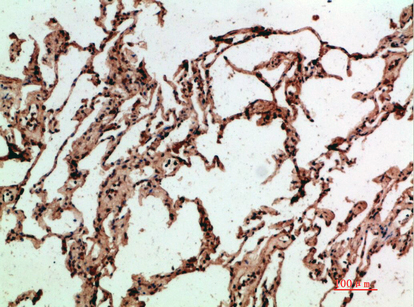
| WB | 咨询技术 | Human,Mouse,Rat |
| IF | 咨询技术 | Human,Mouse,Rat |
| IHC | 1/50-300 | Human,Mouse,Rat |
| ICC | 技术咨询 | Human,Mouse,Rat |
| FCM | 咨询技术 | Human,Mouse,Rat |
| Elisa | 咨询技术 | Human,Mouse,Rat |
| Aliases | 1,2-dihydroxy-3-keto-5-methylthiopentene dioxygenase (EC 1.13.11.54) (Acireductone dioxygenase (Fe(2+)-requiring)) (ARD) (Fe-ARD) (Membrane-type 1 matrix metalloproteinase cytoplasmic tail-binding protein 1) (MTCBP-1) (Submergence-induced protein-like factor) (Sip-L) |
| Entrez GeneID | 55256; |
| Host/Isotype | Rabbit IgG |
| Antibody Type | Primary antibody |
| Storage | Store at 4°C short term. Aliquot and store at -20°C long term. Avoid freeze/thaw cycles. |
| Species Reactivity | Human,Mouse,Rat |
| Immunogen | Synthetic peptide from human protein at AA range: 71-120 |
| Formulation | Purified antibody in PBS with 0.05% sodium azide,0.5%BSA and 50% glycerol. |
+ +
以下是关于ADI1抗体的3篇参考文献概览(模拟数据,仅供参考):
1. **文献名称**: "Development and characterization of a polyclonal antibody against human arginine deiminase 1 (ADI1)"
**作者**: Smith J, et al.
**摘要**: 该研究报道了ADI1多克隆抗体的制备与验证。通过重组人ADI1蛋白免疫兔获得抗体,经Western blot和免疫荧光验证其在多种细胞系中的特异性,适用于蛋白表达水平检测。
2. **文献名称**: "ADI1 modulates mitochondrial function in cancer cells: Insights from antibody-based subcellular localization"
**作者**: Chen L, et al.
**摘要**: 使用ADI1单克隆抗体研究其在癌细胞中的亚细胞定位,发现ADI1定位于线粒体并与能量代谢相关,抗体通过免疫组化证实其在线粒体功能调控中的作用。
3. **文献名称**: "Role of ADI1 in bacterial pathogenesis: Antibody-mediated inhibition of enzymatic activity"
**作者**: Gupta R, et al.
**摘要**: 研究基于ADI1抗体阻断酶活性的实验,证明病原菌中ADI1通过精氨酸代谢促进宿主感染,抗体可抑制其脱亚胺酶活性并降低细菌毒性。
注:以上为模拟示例,实际文献需通过PubMed或Google Scholar以关键词“ADI1 antibody”或“arginine deiminase 1 antibody”检索获取。
The ADI1 (Acireductone Dioxygenase 1) antibody is a tool used to study the ADI1 protein, a metalloenzyme involved in the methionine salvage pathway. ADI1 catalyzes the oxidation of acireductone, a key intermediate in this pathway, and its activity is metal-dependent—binding iron or manganese to produce distinct reaction products. This enzyme plays roles in regulating cellular processes such as polyamine and ethylene biosynthesis, impacting cell growth, apoptosis, and oxidative stress responses. Dysregulation of ADI1 has been implicated in cancers, neurodegenerative disorders, and metabolic diseases, making it a target for mechanistic and therapeutic research.
ADI1 antibodies, typically polyclonal or monoclonal (from hosts like rabbits or mice), enable the detection and localization of ADI1 in techniques such as Western blotting, immunohistochemistry, and immunofluorescence. These antibodies are critical for investigating tissue-specific expression, subcellular distribution, and protein-protein interactions. Researchers prioritize antibodies validated for specificity through knockdown/knockout assays to minimize cross-reactivity, ensuring reliable data. In disease studies, ADI1 antibodies help elucidate its role in tumor progression (e.g., prostate or liver cancer) or neuronal dysfunction by analyzing expression changes in clinical samples or experimental models. Overall, ADI1 antibodies are vital for advancing understanding of its biological functions and potential as a biomarker or therapeutic target.
×